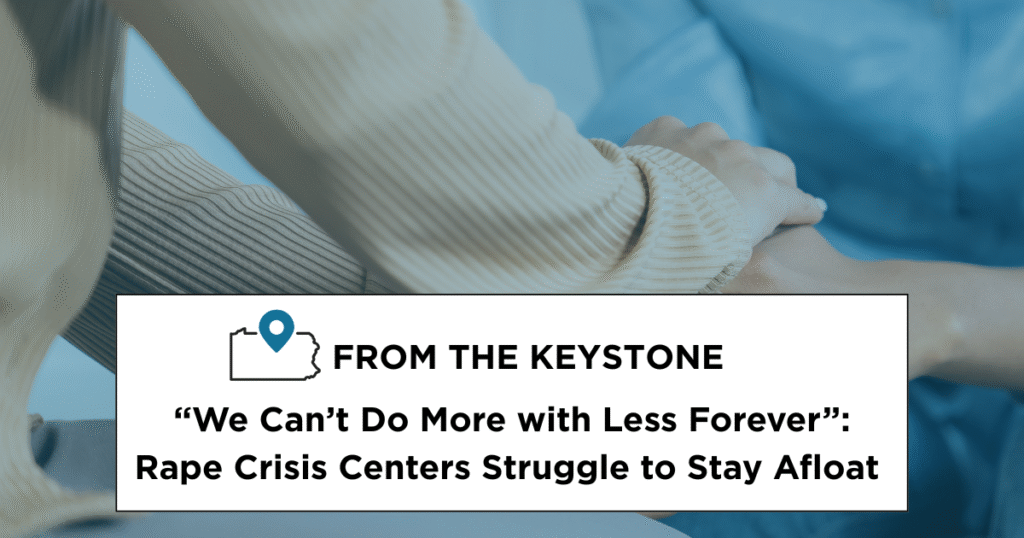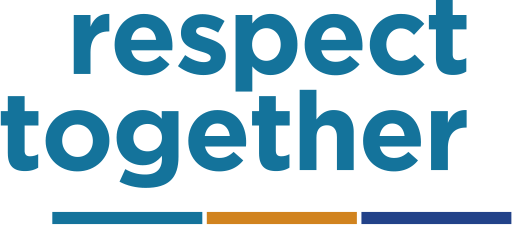
For more than 50 years, Victims Resource Center has been a lifeline for survivors of sexual violence in Luzerne, Wyoming, and Carbon Counties. With three offices spread across a mix of urban and rural communities, the center has always promised that “when a survivor needs help, someone will answer.”
But right now, that promise is under threat.
“We can’t keep asking staff to do more and more with less and less,” said Suzanne Beck, who has worked in the movement for 35 years and now serves as the center’s executive director. “When you go five years without a funding increase, that’s a cut. And with the state budget impasse dragging on for months, I honestly don’t know how we’re going to continue.”
The Hidden Costs of Flat Funding
Answering the hotline is one of the most visible services rape crisis centers provide — but it’s only part of the picture. Centers must also keep the lights on, pay rent, cover insurance premiums, and ensure that every advocate completes the 80+ hours of training required before working with survivors. The bills add up: utilities, payroll, benefits, workers’ compensation, liability insurance.
“All of these costs have gone up year after year,” Beck said. “But our funding has not.”
The state’s Rape Crisis budget line item is the lifeblood that allows centers to keep core services running day after day. While private foundations often support new or specialized initiatives, they rarely cover the ongoing costs of 24/7 crisis response, counseling, or prevention programs. Without steady investment from the state, that backbone has eroded. The result: unfilled staff positions, fewer resources for training and educational programs, and hard choices every day about which survivors can receive immediate support.
The Toll on Advocates
But the impact of flat funding isn’t just financial — it falls heavily on the shoulders of the advocates who show up for survivors every day.
Advocates are on call 24/7, often responding to crisis calls at 2 a.m. and then showing up for work the next morning.
“This isn’t a nine-to-five job,” Beck explained. “It takes an emotional toll to hear these stories repeatedly every day. We have incredible, caring staff, but we can’t keep burning them out.”
When positions are left vacant, the same number of hotline shifts and hospital calls fall on fewer shoulders. Survivors may have to wait longer for therapy appointments, or an advocate may not be available to attend court if they’re already accompanying another survivor at the hospital.
“Nobody wants to tell a survivor, ‘I’m sorry, we can’t be there,’” Beck said. “But sometimes there just aren’t enough people to go around.”
Why It Matters
Rape crisis centers provide essential services that communities often take for granted until they or someone they love needs them. These include:
- Therapy & Counseling – for survivors and their families, which is the most requested service, and the largest unmet need.
- Human Trafficking Survivor Support – including long-term care like safe housing, food, and transportation.
- Medical Advocacy – offering support at a time when no one should be alone, advocates accompany survivors in the hospital during forensic exams and medical treatment after an assault.
- Legal Assistance – helping survivors navigate the justice system, including representation and court accompaniment, a critical service centers provide, though demand far exceeds capacity.
- 24/7 Hotlines – providing immediate access to trauma informed services, centers answered nearly 20,000 hotline calls last fiscal year.
- Prevention Education – programming for schools, workplaces, and community groups to prevent sexual abuse, assault, and harassment, a vital service that currently reaches only a fraction of Pennsylvania students due to limited funding.
“Everyone thinks they’ll never need a rape crisis center,” Beck said. “But crime impacts every family. And when the unthinkable happens, you want these services to be there for your community.”
Across Pennsylvania, rape crisis centers support more than 27,000 people each year — one-third of them children. These are the lives directly touched by the funding decisions made in Harrisburg.
A Call to Action
For Beck, stable funding isn’t just about balancing budgets — it’s about showing that our communities value and care for survivors of sexual assault.
“Adequate funding would mean that survivors matter,” she said, “that the work we’re doing is important, and that somebody cares.”
Her message to lawmakers is direct: “You can’t be tough on crime without being supportive to the victims of those crimes. Supported victims make better witnesses. Please support victims of sexual violence by funding the services they need.”
To survive Pennsylvania’s budget impasse, now stretching past 110 days — centers like Victims Resource Center are dipping into reserves just to stay open, but those funds are limited and dwindling. Survivors can’t wait, and neither can the advocates working around the clock to support them.
What You Can Do
1. Contact your legislators
Urge them to pass the state budget with an $8 million increase to the Rape Crisis line item.
2. Give to the PCAR Bridge Fund
Your donation provides emergency financial assistance to Pennsylvania’s rape crisis centers — keeping doors open, hotlines answered, and staff available for survivors. Donate Here.
Respect Together will match the first $10,000 in donations — doubling your impact.
